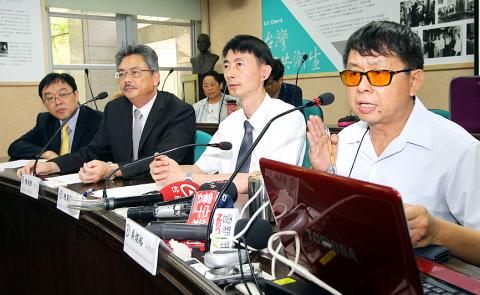Several National Taiwan University professors yesterday criticized the government’s efforts to crack down on food safety violations, saying that the snowballing recycled waste oil scandal highlights a lack of inter-ministerial cooperation and the ineffectiveness of the food safety management system.
Their remarks came one day after the Food and Drug Administration (FDA) released the results of laboratory tests that found the edible lard oil manufactured by Greater Kaohsiung-based Chang Guann Co (強冠企業), which included recycled waste oil collected from restaurant fryers, met legal standards.
“The oil scandal pertains to three ministries: the Ministry of Economic Affairs, which governs factory registration; the Environmental Protection Administration [EPA], which regulates ordinary business waste such as waste cooking oil; and the Ministry of Health and Welfare, which manages edible oil products,” Institute of Environmental Health professor Chen Chia-yang (陳家揚) told a news conference in Taipei.

Photo: CNA
Restaurants that produce waste cooking oil are legally required to inform the EPA about the firms they hire to recycle their oil and the amount that is taken away on each trip, while the recycling companies must submit records on the types and quantity of oil they handle to the economic affairs ministry.
Chang Guann allegedly used waste oil provided by Kuo Lieh-cheng (郭烈成), the owner of an unlicensed factory in Pingtung County, who is believed to have purchased the oil from waste recycler Hu Hsin-te (胡信德), Chen said.
“If the EPA and Ministry of Economic Affairs had cross-checked their records, they should have had no trouble spotting companies that sold or purchased abnormal amounts of the waste oil,” Chen said.
Reducing risks to food safety is not just a job for the FDA, it requires a concerted effort by all relevant government agencies, Chen said.
Wu Kuen-yuh (吳焜裕), a professor at the Institute of Occupational Medicine and Industrial Hygiene, said the reason the FDA’s standard lab tests have detected so few problems in the current and previous food scandals is because the government only regulates 800 kinds of food additives and chemicals when there are more than 70,000 being used nationwide.
“In addition, the failure of police investigators to notify the FDA and local health departments the minute they discovered the [alleged] illegal sales of waste cooking oil and the decision to wait four months to do so underlines the lack of cooperation and coordination between agencies,” Wu said.
College of Public Health dean Chen Wei-jen (陳為堅) said that if the government is serious about eliminating illegal practices in the food industry, it should increase the number of random, unannounced inspections of food manufacturers, rather than relying on the companies’ self-monitoring.

A preclearance service to facilitate entry for people traveling to select airports in Japan would be available from Thursday next week to Feb. 25 at Taiwan Taoyuan International Airport, Taoyuan International Airport Corp (TIAC) said on Tuesday. The service was first made available to Taiwanese travelers throughout the winter vacation of 2024 and during the Lunar New Year holiday. In addition to flights to the Japanese cities of Hakodate, Asahikawa, Akita, Sendai, Niigata, Okayama, Takamatsu, Kumamoto and Kagoshima, the service would be available to travelers to Kobe and Oita. The service can be accessed by passengers of 15 flight routes operated by

Alain Robert, known as the "French Spider-Man," praised Alex Honnold as exceptionally well-prepared after the US climber completed a free solo ascent of Taipei 101 yesterday. Robert said Honnold's ascent of the 508m-tall skyscraper in just more than one-and-a-half hours without using safety ropes or equipment was a remarkable achievement. "This is my life," he said in an interview conducted in French, adding that he liked the feeling of being "on the edge of danger." The 63-year-old Frenchman climbed Taipei 101 using ropes in December 2004, taking about four hours to reach the top. On a one-to-10 scale of difficulty, Robert said Taipei 101

Taiwanese and US defense groups are collaborating to introduce deployable, semi-autonomous manufacturing systems for drones and components in a boost to the nation’s supply chain resilience. Taiwan’s G-Tech Optroelectronics Corp subsidiary GTOC and the US’ Aerkomm Inc on Friday announced an agreement with fellow US-based Firestorm Lab to adopt the latter’s xCell, a technology featuring 3D printers fitted in 6.1m container units. The systems enable aerial platforms and parts to be produced in high volumes from dispersed nodes capable of rapid redeployment, to minimize the risk of enemy strikes and to meet field requirements, they said. Firestorm chief technology officer Ian Muceus said

MORE FALL: An investigation into one of Xi’s key cronies, part of a broader ‘anti-corruption’ drive, indicates that he might have a deep distrust in the military, an expert said China’s latest military purge underscores systemic risks in its shift from collective leadership to sole rule under Chinese President Xi Jinping (習近平), and could disrupt its chain of command and military capabilities, a national security official said yesterday. If decisionmaking within the Chinese Communist Party has become “irrational” under one-man rule, the Taiwan Strait and the regional situation must be approached with extreme caution, given unforeseen risks, they added. The anonymous official made the remarks as China’s Central Military Commission Vice Chairman Zhang Youxia (張又俠) and Joint Staff Department Chief of Staff Liu Zhenli (劉振立) were reportedly being investigated for suspected “serious